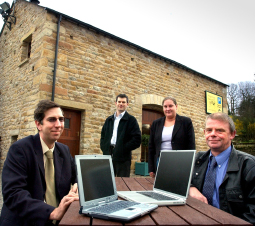Lancaster gets rural community online

A remote Lancashire village is now online thanks to a unique partnership between computer researchers and a determined local community.
Villagers in Wray had been waiting to receive broadband in their village for years when they hooked up with computing experts based in Lancaster’s new information and communications technology centre InfoLab21. Before then the only Internet access had been a slow, often unreliable, dial-up service.
Researchers at Lancaster were keen to discover how wireless technology performs in remote, rural environments so when they heard of the village’s campaign to get on line they decided to offer wireless broadband to the village as a free service and use the network as a research test bed.
The ICT Rural Matrix project has provided Wray residents with valuable advice and training in the basics of using the internet and installing end users onto the broadband network. They are also working with the University and the villagers to test the mesh technology and learn all about it.
The free wireless internet access points in the village pub and café/craft shop now mean that locals can surf the web and enjoy a pint or a coffee. Eventually the whole village will be able to get online thanks to new wireless technology ‘mesh’ boxes placed at strategic locations throughout the area which link together to form a seamless web of coverage.
Lancaster University – the only university in the UK to have its own telecoms licence – already supplies broadband to schools across Lancashire and Cumbria including Wray Primary School through the CLEO (Cumbria and Lancashire Education Online) project.
Now the village has secured broadband coverage they have formed a new organisation – The Wray Community Communications Group - which is exploring ways of ensuring the technology is sustainable and rolling broadband coverage further out to farms and hamlets beyond the village.
Chris Conder, a Wray farmer and campaigner for broadband in the village says that it is essential for rural communities and farmers in particular to have access to broadband to stay competitive. She said: "There are many reasons why a rural area like Wray needs broadband. Farmers have online applications and forms to complete which are crucial to running their businesses and school children are expected to have access to complete their course work at home, as their urban counterparts do. It's not just a case of wanting broadband, it's a case of being disadvantaged if you don't have it."
Dr Nicholas Race, who leads the Network Research and Special Projects Unit at Lancaster University, said: “By working together with the Wray community, we have been able to build a unique wireless test-bed in the village using Mesh equipment. This facility offers researchers a valuable insight into the behaviour of Mesh technology, allowing them to study its effectiveness in delivering reliable, high speed broadband to rural users."
"The project has been a wonderful opportunity to work with the community, and all of those involved in building the network in Wray have learnt a great deal from each other throughout the past year - it has been a truly collaborative effort."
The BBC are building case studies and are using Wray to see how the village makes use of broadband technology. Photograph - L- R Dave Farr Rural Matrix Project ICT Technician, Nicholas Race Lancaster University, Janine Pickering Wray Com Com Project and Howard Seed Wray Com Com Project at the broadband craft barn Wray.